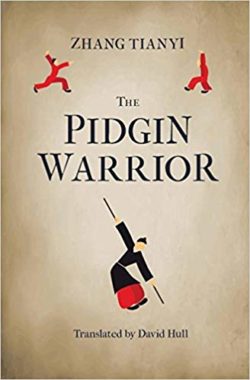The Pidgin Warrior, by Zhang Tianyi
translated by David Hull
Balestier Press, 2017
Publisher's Blurb
In the 1930s, wartime Shanghai is a cosmopolitan metropolis where con-men and dance-hall girls mingle with refugees streaming in from the occupied areas. One of those refugees is Shi Zhaochang. Having read too many gongfu novels, he is convinced that only an elite martial artist with magical powers can save China. He flees to Shanghai on a quixotic search for a gongfu master who can teach him the secret techniques that will make himself that warrior. The fate of China itself hangs in the balance, and everyone has a scheme to save the nation, or at least get rich trying. The Pidgin Warrior is a rollicking satire of nationalism and modernity that is remarkably relevant today.“Satiric brilliance and unusual comic verve.” — C. T. Hsia, A History of Modern Chinese Fiction
Reading Chinese Network Reviews
Reviewed by Cuilin Sang, 14/1/2020
 The Pidgin Warrior is a satirical novella written by Zhang Tianyi (1906-1985) in the 1930s. Most noted for his Dalin and Xiaolin, a children’s book narrating two brothers’ dramatically different lives, among the Chinese younger readers, Zhang also exhibits outstanding satirical wit in works intended for more mature readers. The Pidgin Warrior would be one such work, although it was once categorized also as children’s literature. There is indeed something very childish about the main character, Shi Zhaochang, and generally a one-sidedness in all the characters portrayed, but if the focus is shifted from the characters to the subjects such as patriotism, nationalism, modernity and indigenous Chinese cultural heritage that the book is clearly exploring and presenting, what is unfolded is a ruthless anatomy of deeper, inveterate hypocrisies hidden behind their mismatching contemporaneous labels.
The Pidgin Warrior is a satirical novella written by Zhang Tianyi (1906-1985) in the 1930s. Most noted for his Dalin and Xiaolin, a children’s book narrating two brothers’ dramatically different lives, among the Chinese younger readers, Zhang also exhibits outstanding satirical wit in works intended for more mature readers. The Pidgin Warrior would be one such work, although it was once categorized also as children’s literature. There is indeed something very childish about the main character, Shi Zhaochang, and generally a one-sidedness in all the characters portrayed, but if the focus is shifted from the characters to the subjects such as patriotism, nationalism, modernity and indigenous Chinese cultural heritage that the book is clearly exploring and presenting, what is unfolded is a ruthless anatomy of deeper, inveterate hypocrisies hidden behind their mismatching contemporaneous labels.
On the surface, The Pidgin Warrior reads like a bazaar of western-eastern ideologies hosted by a culturally and politically enervated country attempting to salvage itself through productive exchanges of ideas. Upon closer reading, one may find that Zhang Tianyi seems not interested in any of the ideals, modern or traditional, western or eastern, as an effective means to save the country from its intruders and its impending demise. Daoist adepts, women warriors, western-style patriotic dancers, “elite families” on self-defined hunger strikes, are all job vacancies filled by unscrupulous imposters who aim only for money and physical satiety. The only group of people depicted with true sympathy might be the workers going on strike and begging the main character, the self-deluded “warrior” Shi Zhaochang, for money. And it is when facing oppositional and confrontational situations with the “lower class” people such as the peasants-turned-workers, or the chef working for his family, that Shi Zhaochang’s sense of patriotism and morality seems to be especially out of place. Suspicious that these people might be of the “Path of Evil” that he believes is the ultimate enemy for “warriors” like him, Shi displays a shocking lack of knowledge of the lives of the poor and a strong willingness to maintain the social hierarchy. The “China” that he claims to be fighting for and his imagined “abilities of the Chinese swordsmen” are equally dilapidated and unfit for the urgencies the nation is forced upon.
The complete and total refusal of any ideology as a remedy for the ailing nation infuses the book with a nihilistic ridicule that questions both the practicality of the Chinese traditional wisdom in wartime, and the feasibility of the newly imported western, modern ideas. Shi Zhaochang’s obsession with what he construes as the Daoist and Buddhist martial skills, hilarious as it is, is reflective of a true tragedy happening in the 1930s China. His failure exposes the frailties of an old civilization losing its competitivity and cultural advantage. As a member of the higher echelon of the society, Shi embodies an escapist, old-style attitude towards the impact, power and threat of modernization that will only result in loss and chaos. In this sense, The Pidgin Warrior is also a satirical elegy on the crumbling of a prestigious class in pre-modern China.
Zhang Tianyi writes with a dexterity and cunningness that could pose great difficulties for the translator. Yet David Hull has done an exceptional job in his faithful and flawlessly fluent rendering of the linguistic and cultural complexities in the story. In untranslatable situations, his efficiency and proficiency in deciding what to add and what to leave out successfully preserve and translocate the verbal sap, pungency and humor. The introduction of the main character’s name, for example, is translated as such:
“Zhaochang. The first character Zhao is ‘omen’ as in a ‘bad omen,’ and the Chang? Chang… Chang is… It’s ‘prostitute’ but without the female part”.
Additionally Hull uses a note to explain the connotations of the character Chang 昌 (p. 17), but his wise decision to add the word “prostitute” that does not appear in the original text enlivens the sentence in such a way that not only the meaning, but also the humor, is activated. Hull even manages to instill a tinge of Shanghai dialect into the English-language text. In multiple places, he keeps the modal particle “la” for the Shanghai dancer Miss He: “Why ain’t you come by my place la?” “I must hold on la!” “I love you la!” (pp. 143-144) Whether these sentences in English convey the same breeziness and languor in their original Chinese form is hard to evaluate, but such practice is refreshingly innovative and almost certainly echoes the positive “pidgin” linguistic style that Zhang Tianyi experiments with in his work.
Reviewed by Cuilin Sang
Reviewed by Vicki Leigh, 3/7/2019
 ‘Let’s get down to business, to defeat… the… ‘XX’.’
‘Let’s get down to business, to defeat… the… ‘XX’.’
Everyone is out there to capitalise on the XX (Japanese) invasion, most of all young, simple Shi Zhaochang, whose capital assets revolve around his superior gongfu skills that will naturally save all of China from the evil, antagonistic Japanese. In Zhang Tianyi’s biting 1930s satire, Zhaochang sets out on an improbable journey to find a master to train him so that he may live out this destiny.
He will bring honour to us all, Mulan-style.
Zhaochang - literally ‘flourishing omen’ - is the ‘great hero of national salvation reached maturity and must soon appear to undertake great things’, or so he takes it upon himself to prove he is not the ‘take it or leave it’, wishy-washy elder son his father perceives him to be as they journey from Beijing to Shanghai by train as refugees haunted by maltreatment at the hands of brutal farmers.
The ludicrousness of ‘national essence’ in China is broached, and in summary, signifies the ‘inborn’ (read: flagrantly insubstantial) superficialities citizens of each province or region might have that unifies them. However, this is illuminated confusingly to the reader as ‘eating hot peppers is the ethnic essence of northerners’, as the ‘ethnic essence of the northerners’ is also to ‘eat steamed bread’. As a student of Chinese Studies, I was always told it was southerners that loved the peppers and northerners the bread, and thus I remain a little baffled as to whose ‘ethnic essence’ the hot peppers belong to.
The cast’s frenzied lexicon sprawls all over the show, from the ‘flowing’ Mandarin, to Cantonese, to the Shanghainese dialect, and this goes to show that although everyone should be uniting against the feared ‘XX’, they cannot even appear to agree on discourse in the same vernacular. How could China ever show a unified front?
An aspect of the dialogue which had me irked was the constant trailing off by the characters, often mid-sentence: ‘And yet… and yet…’, and ‘Since, since… since that…’. The amount of times this occurred felt incredibly unnecessary, and I was left unsure as to what this particular literary device was supposed to lend the novel, as it was rather distracting.
Praise be to translator David Hull, who has carried out some remarkable work on this novel considering the catalogue of puns, dialects and deeply rooted historical references in order to cater to those who may not be entirely familiar with Chinese language and culture. Early on there is one hilariously convoluted depiction of family relations, and as a westerner I had to chuckle as I cannot even imagine how this would have looked in the original text in Chinese: ‘her elder brother’s son’s sister’s sister’s son’s great granddaughter’s husband is one of my cousin’s mother’s brother’s brother’s son’s sister’s husband’s aunt’s son.’ So… not her shushu then?
Further to this, Hull is American, and so I was astonished to see the words ‘bum’, ‘fortnight’ and ‘poor sod’ in the text, as it was only later that I discovered he was not British. How fun! I also pondered the use of the archaic spelling of ‘summersault’. Was this deliberate? I cannot fathom.
One refreshing aspect of this novel was that there was no explicit nor exploitative sex to be found, unlike quite a lot of translated modern Chinese literature being published of late, and I relished the chance to enjoy a satirical adventure novel for what it was.
This will serve as a review.
The reviewer, July 2019
Reviewed by Vicki Leigh
